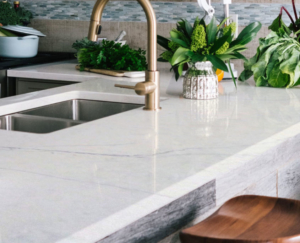Understanding the Cost of Quartz Countertops: Complete Guide
Understanding the Cost of Quartz Countertops
As you start planning your kitchen renovation or remodeling project, one of the most important decisions you’ll have to make is choosing the right countertop material. While there are plenty of options available, more and more homeowners are opting for quartz countertops due to their durability, low maintenance, and wide range of colors and patterns.
But how much do quartz countertops actually cost, and what factors should you consider when budgeting for this popular material? In this guide, we’ll break down everything you need to know about the cost of quartz countertops.

Salerno – Metro Quartz Countertop
What is the Average Cost of Quartz Countertops?
The cost of quartz countertops varies depending on a number of factors, such as the type of quartz, the size and layout of your kitchen, and the complexity of the installation process. On average, however, you can expect to pay around $60 to $100 per square foot for quartz countertops, including installation. This means that if you have a standard-sized kitchen with 55 square feet of countertop space, you can expect to spend between $6,000 and $9,800 on your quartz countertops.
Factors That Affect the Cost of Quartz Countertops
- Type of Quartz: Not all quartz countertops are created equal. Some brands or types of quartz may be more expensive than others, depending on factors such as the quality of the quartz used, the availability of the material, and the brand name.
- Size of the Kitchen: The larger your kitchen, the more quartz material you’ll need to cover your countertops, which will increase the overall cost of your project. Additionally, if you have an unusually-shaped kitchen, such as one with a lot of corners or angles, this can also impact the cost of your installation.
- Edge Profile: The edge profile refers to the shape of the edge of your countertop. This can range from a simple straight edge to more intricate shapes such as bullnose or o’gee. More complex edge profiles may require additional labor and expertise, which can drive up the cost of your installation.
- Sink and Faucet Cutouts: If you’re replacing a sink or faucet along with your countertops, you’ll need to account for the cost of cutting out the necessary holes to accommodate these fixtures.
- Backsplash: Depending on your preference, you may choose to install a quartz backsplash along with your countertops. This can add additional cost to your project, as the material will need to be cut and installed separately.
Benefits of Quartz Countertops
Quartz countertops offer a range of benefits that can make them an ideal choice for a durable and low-maintenance countertop material. Some of the top benefits include:
- Stain-Resistance: Quartz is a non-porous material, which means that it is highly resistant to stains and spills. This can be especially beneficial for people who love to cook and entertain but don’t want to spend a lot of time cleaning up after meals.
- Low Maintenance: Unlike other countertop materials such as granite or marble, quartz does not need to be sealed or polished on a regular basis. This can save you time and money on maintenance over the life of your countertops.
- Durability: Quartz is one of the most durable countertop materials available, withstanding scratches, chips, and other common wear and tear. This can be especially beneficial for those who want a countertop material that can withstand the demands of a busy household.
- Versatility: Quartz comes in a wide range of colors and patterns, making it easy to find a style that complements your kitchen design.
Tips for Saving Money on Quartz Countertops
While quartz countertops may come with a higher price tag than some other materials, there are a few ways to save money on your project without sacrificing quality. Here are a few tips to keep in mind:
- Choose a mid-range quartz brand or type: While high-end quartz may offer more unique colors and patterns, you can often achieve a similar look with a mid-range brand or type that is more budget-friendly.
- Stick to a simple edge profile: While complex edge profiles can add visual interest to your countertops, they can also add significant cost to your installation. Consider opting for a simple straight edge or beveled edge instead.
- Use slide in range: If you select a slide in range, you won’t pay for the fabrication of the material that where the range is located. On the other hand, if you use a cooktop, you are paying for the material that is surrounding the cooktop adding to the cost of the countertop.
- Shop around for quotes: Home centers will not necessarily have the best prices. While the initial promotion may be enticing there are a lot of hidden costs. Be sure to get the final price for the entire job including material, fabrication, installation, and taxes. Don’t be afraid to negotiate or ask for discounts or promotions.
Final Thoughts
Quartz countertops can be a great investment for those who want a durable and low-maintenance countertop material that will last for years to come. While the cost may be higher than some other materials, the benefits and versatility of quartz can make it a worthwhile investment in your home. By understanding the factors that impact the cost of quartz countertops you can make a smart and budget-conscious choice for your kitchen renovation or remodeling project.
For more information about Quartz Countertops visit here.
If you have additional questions, please text or call Valerie at (714) 528-3789

